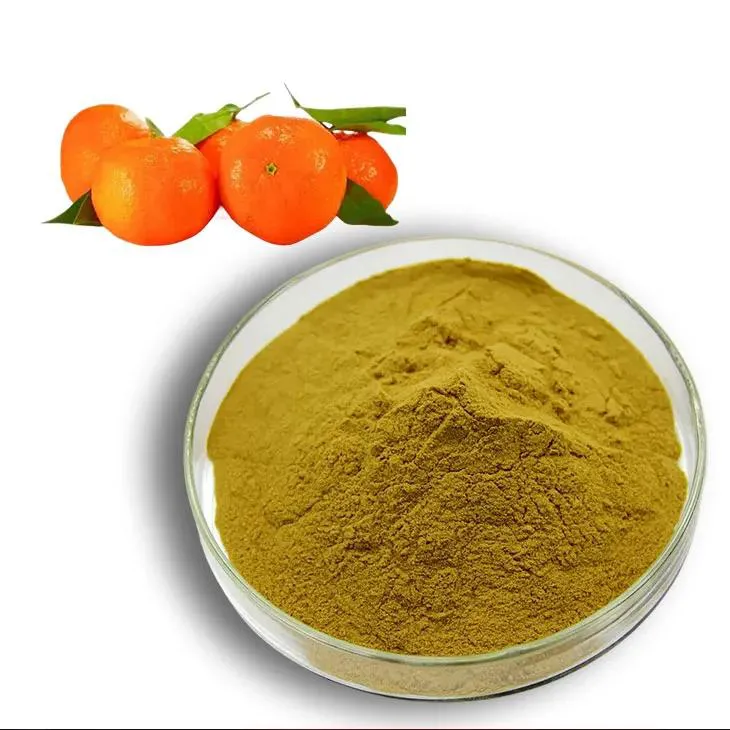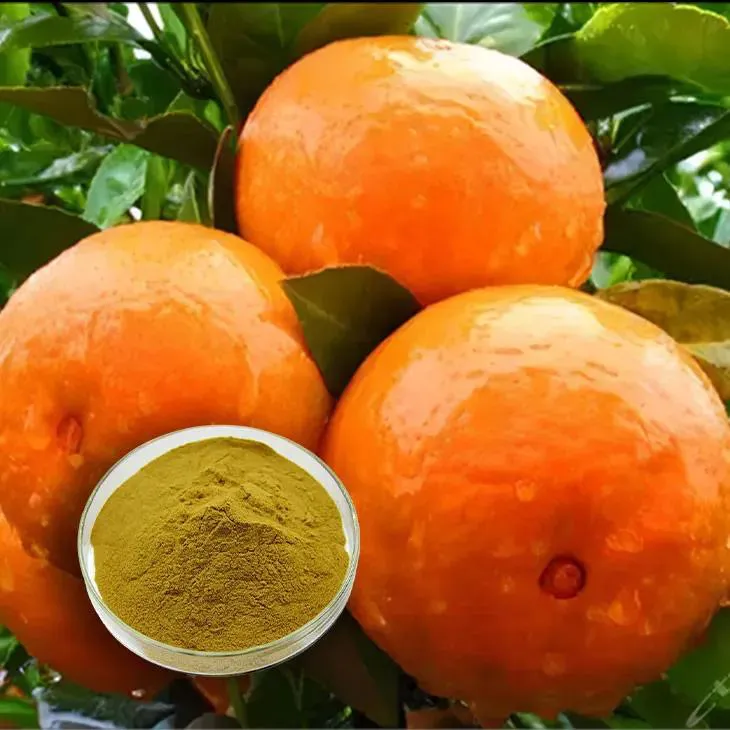- 0086-571-85302990
- sales@greenskybio.com
Are citrus bioflavonoids beneficial for diabetes? Are these all safe and applicable for diabetic patients?
2024-11-13

1. Introduction
Diabetes has become a global health concern, affecting millions of people worldwide. Management of diabetes often involves lifestyle modifications, medications, and sometimes dietary supplements. Citrus bioflavonoids have recently emerged as a potential component in the management of diabetes. But the question remains: are they truly beneficial, and are they safe for diabetic patients? This article aims to explore these aspects in - depth.

2. What are Citrus Bioflavonoids?
2.1 Definition
Citrus bioflavonoids are a group of polyphenolic compounds found in citrus fruits such as oranges, lemons, and grapefruits. They are responsible for the color, flavor, and antioxidant properties of these fruits. Examples of citrus bioflavonoids include Hesperidin, naringin, and Quercetin.2.2 Sources
- Oranges are a rich source of Hesperidin. This compound is found in the peel and pulp of the orange.
- Lemons contain bioflavonoids like eriocitrin. The lemon peel is especially concentrated with these compounds.
- Grapefruits have naringin, which gives the fruit its characteristic bitter taste. The white part of the grapefruit peel and the pulp both contain naringin.

3. Potential Benefits for Diabetes
3.1 Blood Glucose Regulation
Some studies suggest that citrus bioflavonoids may play a role in regulating blood glucose levels. For example, Hesperidin has been shown to improve insulin sensitivity in animal models. Insulin sensitivity is crucial for diabetic patients as it allows the body to use insulin more effectively to regulate blood sugar. In vitro studies have also demonstrated that certain bioflavonoids can inhibit enzymes involved in carbohydrate digestion, thereby reducing the rate of glucose absorption into the bloodstream.3.2 Antioxidant Effects
Diabetes is associated with increased oxidative stress. Citrus bioflavonoids, being antioxidants, can help combat this oxidative stress. Oxidative stress can damage cells and tissues, including those in the pancreas that produce insulin. By reducing oxidative stress, bioflavonoids may contribute to the preservation of pancreatic function. For instance, Quercetin has been found to scavenge free radicals and protect cells from oxidative damage.3.3 Anti - inflammatory Properties
Chronic inflammation is often present in diabetes. Bioflavonoids have anti - inflammatory properties that can potentially reduce this inflammation. Inflammation can disrupt normal physiological processes and contribute to the development of diabetic complications such as neuropathy and nephropathy. By reducing inflammation, citrus bioflavonoids may help in preventing or delaying the onset of these complications.
4. Safety Considerations
4.1 General Safety
In general, citrus bioflavonoids are considered safe when consumed in moderation as part of a normal diet. However, when taken in supplement form, there are some considerations. For most people, taking citrus bioflavonoid supplements at recommended doses is not likely to cause significant harm. But some individuals may experience mild side effects such as gastrointestinal discomfort, including nausea, diarrhea, or abdominal cramps.4.2 Interactions with Medications
- One important concern is the interaction with diabetes medications. Some citrus bioflavonoids may enhance the effects of hypoglycemic drugs, leading to a risk of hypoglycemia (low blood sugar). Diabetic patients who are taking medications to lower their blood sugar should be cautious when starting citrus bioflavonoid supplements and should monitor their blood sugar levels closely.
- There may also be interactions with other medications, such as anticoagulants. For example, some bioflavonoids may have anti - platelet effects, which could potentially increase the risk of bleeding in patients taking anticoagulant medications.
5. Applicability for Diabetic Patients
5.1 Dietary Inclusion
Incorporating citrus fruits into the diet is a natural and generally safe way for diabetic patients to potentially benefit from citrus bioflavonoids. Eating a variety of citrus fruits can provide a range of bioflavonoids along with other nutrients like vitamin C. However, patients should also be aware of the carbohydrate content of citrus fruits, especially if they are on a strict diet to control blood glucose levels.5.2 Supplement Use
- If a diabetic patient decides to take citrus bioflavonoid supplements, it is advisable to consult a healthcare provider first. The healthcare provider can assess the patient's overall health, current medications, and individual risk factors to determine if the supplement is appropriate.
- Patients should also look for high - quality supplements from reliable sources. Poor - quality supplements may not contain the claimed amounts of bioflavonoids or may be contaminated with other substances.
6. Research Gaps and Future Directions
While there is some evidence suggesting the potential benefits of citrus bioflavonoids for diabetes, more research is needed.
6.1 Long - term Studies
Most of the current studies are short - term or in vitro studies. Long - term human studies are required to determine the true efficacy and safety of citrus bioflavonoids in the management of diabetes. These studies would also help in understanding any potential long - term side effects.6.2 Mechanistic Studies
Although some mechanisms of action have been proposed, further research is needed to fully understand how citrus bioflavonoids interact with the body's physiological processes in diabetes. For example, more studies are needed to clarify how they exactly regulate blood glucose levels at the molecular level.7. Conclusion
Citrus bioflavonoids show potential benefits for diabetes, including blood glucose regulation, antioxidant, and anti - inflammatory effects. However, safety considerations, especially regarding interactions with medications, are important. Diabetic patients can consider incorporating citrus fruits into their diet, but should exercise caution when using supplements. More research, particularly long - term and mechanistic studies, is needed to fully establish the role of citrus bioflavonoids in the management of diabetes.
FAQ:
1. What are citrus bioflavonoids?
Citrus bioflavonoids are a group of plant - derived compounds found in citrus fruits such as oranges, lemons, and grapefruits. They are known for their antioxidant properties and can have various effects on human health.
2. How might citrus bioflavonoids benefit diabetes?
Citrus bioflavonoids may benefit diabetes in several ways. They can potentially help with blood sugar regulation by improving insulin sensitivity. Some studies suggest that they may also have anti - inflammatory effects, which could be beneficial for diabetic patients as diabetes is often associated with chronic inflammation. Additionally, they might contribute to cardiovascular health, which is important for diabetics who are at a higher risk of heart disease.
3. Are all citrus bioflavonoids safe for diabetic patients?
While many citrus bioflavonoids are generally considered safe for diabetic patients, individual responses may vary. Some people may be allergic to citrus fruits or certain bioflavonoids. Also, if a diabetic patient is taking medications, there could be potential interactions. For example, some bioflavonoids might enhance the effects of blood - thinning medications. It is always advisable for diabetic patients to consult their healthcare provider before starting any new supplement containing citrus bioflavonoids.
4. How can diabetic patients incorporate citrus bioflavonoids into their diet?
Diabetic patients can incorporate citrus bioflavonoids into their diet by consuming citrus fruits like oranges, lemons, and grapefruits in moderation. They can also consider drinking unsweetened citrus juices. Another option is to look for dietary supplements that contain citrus bioflavonoids, but again, it's crucial to consult a healthcare provider first.
5. Are there any side effects of citrus bioflavonoids in diabetic patients?
In general, when consumed in normal amounts through diet, side effects are rare. However, if taken in excessive amounts as supplements, some people may experience gastrointestinal issues such as nausea, vomiting, or diarrhea. Also, as mentioned earlier, potential interactions with medications can lead to adverse effects in diabetic patients.
Related literature
- The Role of Citrus Bioflavonoids in Diabetes Management"
- "Citrus Bioflavonoids: Benefits and Safety Considerations for Diabetic Population"
- "Bioflavonoids from Citrus Fruits and Their Impact on Diabetes - Associated Complications"
- ▶ Hesperidin
- ▶ citrus bioflavonoids
- ▶ plant extract
- ▶ lycopene
- ▶ Diosmin
- ▶ Grape seed extract
- ▶ Sea buckthorn Juice Powder
- ▶ Beetroot powder
- ▶ Hops Extract
- ▶ Artichoke Extract
- ▶ Reishi mushroom extract
- ▶ Astaxanthin
- ▶ Green Tea Extract
- ▶ Curcumin Extract
- ▶ Horse Chestnut Extract
- ▶ Other Problems
- ▶ Boswellia Serrata Extract
- ▶ Resveratrol Extract
- ▶ Marigold Extract
- ▶ Grape Leaf Extract
- ▶ blog3
- ▶ blog4
- ▶ blog5
-
Organic Tongkat Ali extract powder factory.
2024-11-13
-
How to make powder with ashwagandha extract.
2024-11-13
-
Rosehip extract manufacturers from China.
2024-11-13
-
The best cat's claw extract in nature.
2024-11-13
-
Chinese Dandelion Leaf Extract Suppliers.
2024-11-13
-
Beetroot juice Powder
2024-11-13
-
Selenium yeast
2024-11-13
-
Sophora Flavescens Root Extract
2024-11-13
-
Konjac Powder
2024-11-13
-
Oat Straw Extract Powder
2024-11-13
-
Lotus leaf extract
2024-11-13
-
Yohimbine Bark Extract
2024-11-13
-
Thunder God Vine Extract
2024-11-13
-
Black Rice Extract
2024-11-13
-
Maca Extract
2024-11-13





















